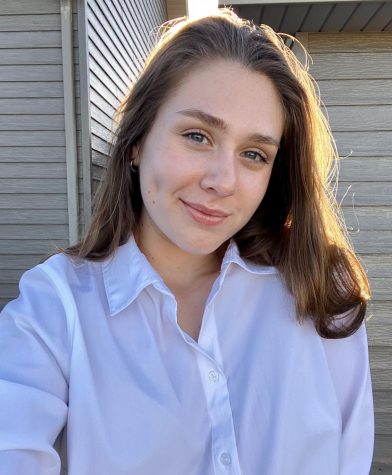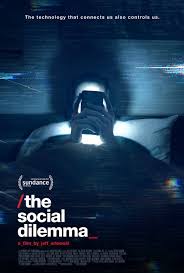‘The Social Dilemma’ offers glimpse into surveillance capitalism
“Nothing vast enters the life of mortals without a curse” –Sophocles
This is the quote that opened “The Social Dilemma,” an Exposure Labs documentary directed by Jeff Orlowski and written by Orlowski, Davis Coombe and Vickie Curtis, released on Jan. 26 of this year.
According to the film’s website, the work was intended to address social media’s effects on our psychological balance—especially how large tech companies are knowingly upsetting that balance, tipping our internal scales to turn a larger profit.
Through interviews with the masterminds, managers, and ex-employees behind Google, Facebook, Instagram, Twitter, Pinterest and many more, “The Social Dilemma” brought to light many points that society experiences every day: rising anxiety, depression, self-harm and suicide rates, especially in young girls, extreme levels of political polarization and the spread of propaganda and misinformation, and most concerningly, the idea that if you are not the one selling the product, you are the product.
Dr. Shoshana Zuboff, professor emeritus of Harvard Business School and the author of “The Age of Surveillance Capitalism,” said that technology-based businesses sell certainty to their advertisers in a way that has never been harnessed before through their ability to harvest their users’ data.
“It’s a marketplace that trades exclusively in human futures—just like there are markets that trade in pork belly futures, or oil futures” Zuboff said. “We now have markets that trade in human futures at scale, and those markets have produced the trillions of dollars that have made the internet companies the richest companies in the history of humanity.”
Scripted sections were weaved into the statistics and interviews to further represent the points being made throughout the film.
The dramatic breaks follow a fictional middle-class family suffering from technology addiction—namely the two youngest children, middle schooler Isla (played by Sophia Hammons) and high schooler Ben (Skyler Gisondo). The oldest child, Cassandra (Kara Hayward), who does not have social media, seems to have the sole purpose of chastising her family for using such platforms.
There are also three “characters” who all represent the Artificial Intelligence in Ben’s phone (played by Vincent Kartheiser).
The three humanoids work together as “the algorithm” to learn Ben’s mind and adapt to his interests, feeding him what he wants to see until they learn enough of his habits to keep him hooked. This led to quick profits, selling Ben’s attention to the highest-bidding companies for their ads to appear among his mindless scrolling, ultimately influencing his behavior and decisions.
While I believe the split A.I. was meant to further symbolize the men at the top of the technology hierarchy selling what Zuboff described as one’s “human future,” it was more like watching a trio of comical super villains.
The writers of “The Social Dilemma” also took stabs at the demonstration of ideologies through fictional means.
This was especially shown politically, with the prominence of neither leftist or rightist parties, but instead the “Extreme Center,” which I can only describe as a conspiracy-anarchist group overtaking the country.
The only information hinting at this organization’s creed, whether on obscure picket signs or on social media, screamed things like “DEFY”, “TIME TO BE A MAN” , and “DON’T VOTE!” with symbols of weapons, as well as influencers on a platform reminiscent of YouTube feeding propaganda to their viewers.
Even the signs featured in the multiple protest scenes were extremely vague and cleverly disguised among the crowd, so the fear wasn’t really produced from what the Extreme Center stood for, but more so the larger idea that the nation’s young people could easily fall prey to such radical expressions.
After re-watching the final Extreme Center protest scene, Ben and Cassandra were arrested after bumping into a couple of cops on their way to find each other through the shoving sea of outraged protestors.
What I believe the documentary was trying to convey in this moment was that even through seemingly innocent means like participation in social media and other internet platforms, bystanders are easily swept into larger, more nefarious causes that are sometimes beyond their control.
But the actual exchange between the police and Ben and Cassandra is worth a whole other conversation.
There was so much to unpack with this film that I have to give it two separate ratings. In terms of the fictional story line, I found it more humorous and random at times than serious, watching the writers and producers tiptoe around certain issues without upsetting anyone directly.
I understand that to remain unbiased, you cannot assign blame to specific, real-life groups while trying to represent larger issues that plague society as a whole, so what could they really do? But still, in my opinion, the way the team went about demonstrating social media’s detrimental effects felt a little gimmicky at times. So, I would give the dramatic writing a 6/10.
However, I would give the informational, interview-based portions a 9/10, due to their credible sources and eye-opening statistics, bringing to light ideas that deserve critical thought and discussion. I highly suggest that future viewers commit themselves to listening to the documentary’s points of view, as well as reading between the lines at times to fully comprehend its message.
21cleiker@usd489.com

Caitlin Leiker is a senior, and this is her third year in newspaper. She is involved in Chamber Singers, Musical, Spring Play, National Honor Society,...






